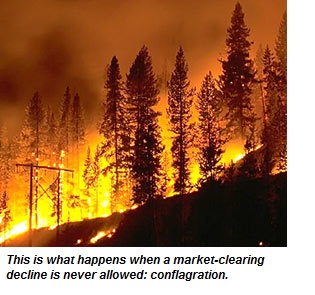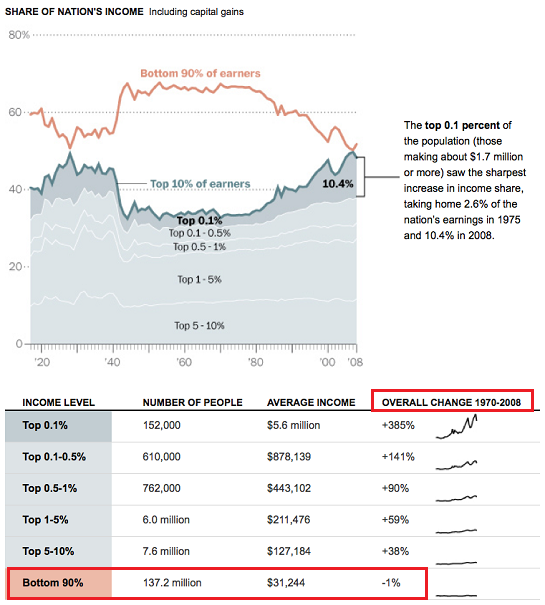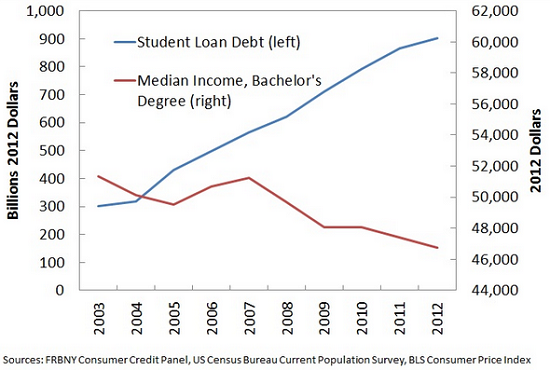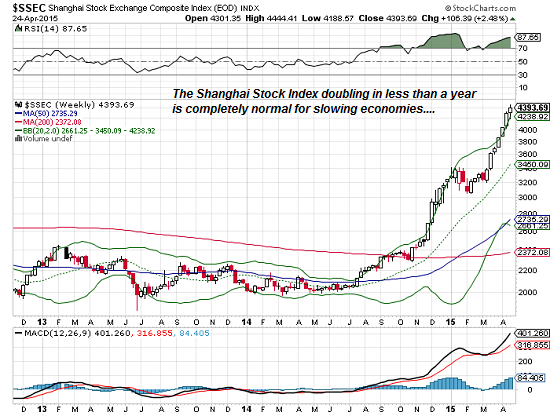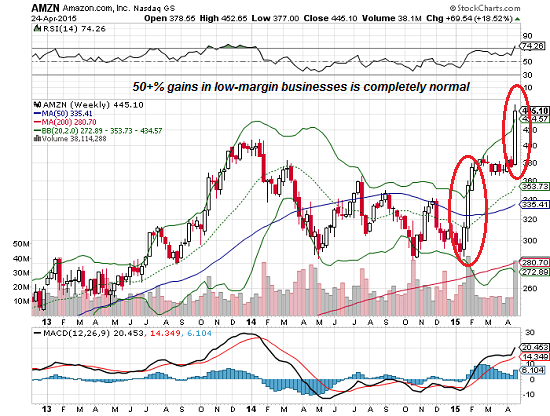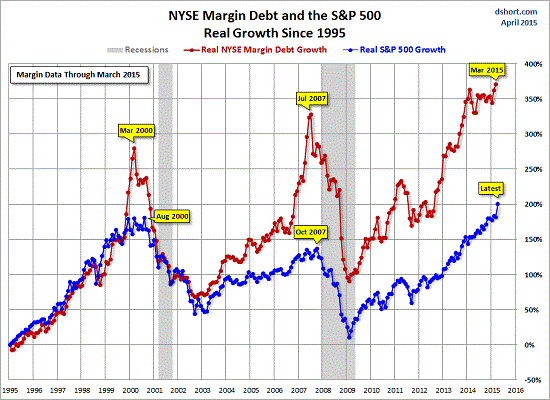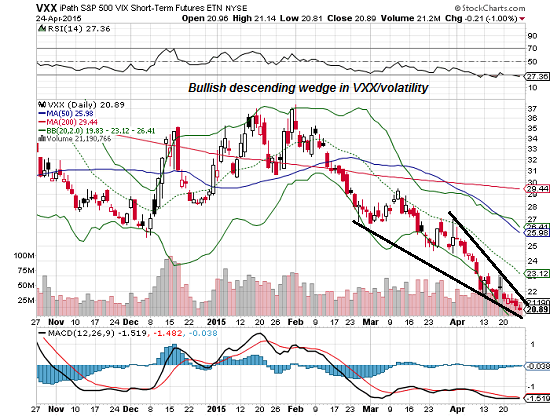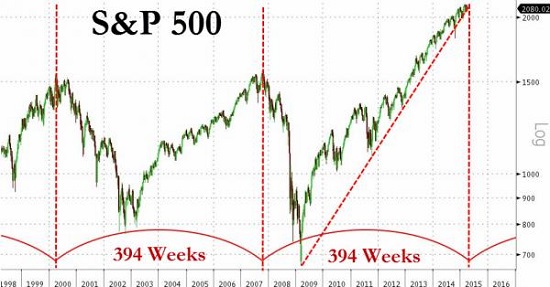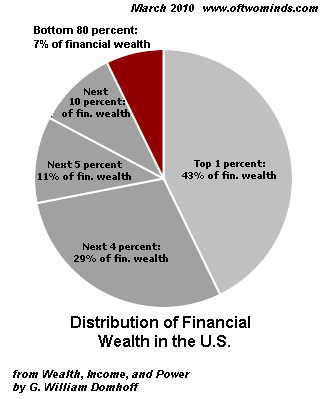Claiming to own X quantity of gold is one thing, and reporting how many times the gold has been pledged as collateral is another.
When correspondent Scott A. Batten offered to write an explanation of the rehypothecation of gold and why it matters, I quickly accepted. Like many others, I have breezed over the word rehypothecation with the basic understanding that it means assets pledged by counterparties (such as the infamous copper stored in Chinese warehouses) are reused as collateral/repledged--in effect, the same assets are pledged as collateral multiple times.
But beyond this, I have not had a clear understanding of how the rehypothecation of gold reserves threatens the whole shaky edifice of Infinite Greed, oops, I mean neoliberal capital markets.
Here is Scott's commentary:
When introducing a new concept, it is best to start with the definition of the words to be used. In this case, the discussion of rehypothecation and how it places the world at risk with the fun and games played in the stock market.
Rehypothecation:
Rehypothecation occurs when your broker, to whom you have hypothecated -- or pledged -- securities as collateral for a margin loan, pledges those same securities to a bank or other lender to secure a loan to cover the firm's exposure to potential margin account losses.
When you open a margin account, you typically sign a general account agreement with your broker, in which you authorize your broker to rehypothecate.
Now, let’s put this into easy to understand language. Let’s say that you have ten dollars. You take it to the bank to let them “borrow” it, while paying you interest. What you have done, in reality, is given them your money to use as they see fit, while giving you a small percentage of the gains that they will earn. A bank would loan the money to a home buyer or perhaps a small business. At the very least, they can lend all the money in excess of their requirement to hold some cash as reserves--say 10% for ease of math.
They now have nine dollars to invest. Their last resort is to offer it to another bank for that bank to “hold”, because that bank doesn’t have enough money to meet its required reserves. Seems simple enough, right?
Welcome to the games bankers play to make money. Now that this simple format is in place, let’s move to where the serious dangers lie.
Precious Metals:
During World War II, many foreign countries feared that their gold reserves, which at the time backed their paper money, might be taken by an enemy and in 1939, the good old USA was a very neutral country, like Switzerland, only there was a much better deterrent than the Alps-- the Atlantic Ocean. So, many countries--England, France, and others--sent us their gold bars to be stored alongside ours in Fort Knox. Later, after the war was over, we convinced them that it was fine to leave it there and in fact, with the Cold War starting other countries joined in, including Germany.
Now, what good is a pile of gold sitting in a fort going to do? It costs a lot to protect it, and the US was paying a small sum in interest, while getting a smaller sum back in “protection fees”. So, the Federal Reserve had a wonderful idea, at least in their minds.
Since we have this gold, let’s issue paper on that gold as though it was ours, after all it is sitting in Fort Knox, and earn a bit of money on the side. So long as the Cold War lasted, the gold certainly wasn’t going anywhere. Here is where the trouble began. It was pretty small potatoes for a good while, until we went off the gold standard in 1971 during the Nixon Administration. What good is having a precious metal to back fiat currency, when a promise is just as good? Enter the danger zone.
Now, the gold in Fort Knox isn’t doing anything. So, what to do? Well, each bar of gold has a unique mark on it to say who owns it. The Cold War is still raging, so no one is going to ask for it back anytime soon. Let’s melt down some of that gold, just a small percentage of it, and sell it off as bullion. Gold is high and the foreign countries won’t ask for it all, so let’s skim a bit here and there. No one will know, and we can make money.
Then debts started to accrue, so they got brazen and started melting bars and reselling bars as their own gold, because they don’t want to use their own gold, when German gold is just the same, except for that little mark. Erase the mark and put your own on it and sell it as yours, using your gold as the “backer” in case Germany asks for some of it back.
Well, it wasn’t long until greed set in. Those gold bars that were sold to say, China or Japan, were resold to Austria or Iraq. Much like the bundling and reselling of home loans in the 1990’s, soon the German melted gold was in seven different countries with seven different marks, but no German mark upon them remained. This still wasn’t the breaking point though, after all there is still plenty of Gold in Fort Knox to cover what is owed to them.
I don’t know who’s idea it was, but it was a bad idea. They decided that they could sell paper promises of gold being held in the vaults. The last number I saw was 140%. Which means that if they have 100 pounds of gold, they can sell paper as though they have 140 pounds of gold. Now, they can also sell that gold outright as well. So, it's possible that they could sell 140 pounds of paper gold and sell a portion of the physical gold. too.
Confused yet? Here is where we stand today. No one knows how much gold is really in Fort Knox. We only know what they say is in Fort Knox. The same is likely true for the Federal Reserve and possibly the major banks; after all, if the Fed starts demanding to know what’s in those banks, they might have to show theirs too. So, let’s say that the economy starts to really go south around the world. As you know from the news, Germany asked to see their gold at Fort Knox and were denied, so they asked for their gold back. Smart move on Germany’s part in my mind. Answer from the Fed, we will get it to you sometime in the near future. This wasn’t challenged by Germany.
Why? Rehypothecation. Germany knows that they have been doing the same thing with gold that we have. It’s been sold to multiple people at the same time, under the theory that not everyone will want it at the same time, so we can just move it around as needed.
This game of musical golden chairs works fine, until the musical economy stops. When countries start to rack up debt and desire to sell their own gold to pay the bill, and they can’t get it, they get nervous. Now, if the economy is going south and the price of gold is heading up because of fear, those people holding paper gold in the form of futures or just deposit promises begin to sell off for profit or out of financial need. So long as it’s a trickle, no problem, but if it becomes a torrent....
Remember the 140% rule? Well, what if the Federal Reserve only kept 60% of the 100% that the paper gold was written on? Now there is an 80% shortage. Someone is about to have their musical golden chair pulled out from under them. They will get paid, BUT that payment will come as fiat currency. As the golden parachute deflates, how good is fiat currency? This is why there are so many on the fringe demanding to see the gold reserves and others are saying gold will hit $5,000 an ounce or higher. It is theoretically possible that for each gold promise, that it is backed by 1/5 or less of physical gold. No one knows, because no one can audit the physical gold.
China is getting ready to release their gold reserves. That is, they will do like the Fed and say how much they have. We cannot call them on their real reserves, because then they can do the same to us. Now, if all the gold is still in Fort Knox and the Federal Reserve, then the US can call for a real accounting and show ours as well.
However, if we don’t and China does, and calls for the US to do the same, then a lot of fear enters the market. There is a reason that people say "never own paper metals." This is that reason. You might get the value of that gold, but it will be in fiat currency and if things are crumbling then fiat promises become flat losses.
Thank you, Scott, for the explanation. It's a funny thing about financial games; whatever the Mainstream Financial Media mocks as conspiracy theories often later turn out to be accurate.
I do not claim any expertise in the gold/paper gold markets, but it's clear that claiming to own X quantity of gold is one thing, and reporting how many times the gold has been pledged as collateral is another. In a transparent financial system, the citizens of the U.S. would be invited to tour Fort Knox (in small, secure groups, of course) and count the nation's gold directly. What's the harm in showing off the gold to anyone willing to go through security?
Why keep the nation's gold reserves so mysteriously secret? What's the point in being so cagey about it? Maybe rehypothecation isn't the reason for the secrecy; then what is? Fear of precisely what? Isn't gold supposed to be a foolish relic? What's the danger in letting people look at the foolish relic and count the bars and note the serial numbers on the bars? What's the risk in that?
I propose turning Fort Knox into a profitable tourist attraction. If gold is just a foolish relic, then charge $50 a person to wander around "our" gold. It's not like anyone can slip a heavy bar into their purse or pocket without being detected. Put it behind bulletproof glass if you want. What's the risk?
Get a Job, Build a Real Career and Defy a Bewildering Economy(Kindle, $9.95)(print, $20)

Are you like me? Ever since my first summer job decades ago, I've been chasing financial security. Not win-the-lottery, Bill Gates riches (although it would be nice!), but simply a feeling of financial control. I want my financial worries to if not disappear at least be manageable and comprehensible.
And like most of you, the way I've moved toward my goal has always hinged not just on having a job but a career.
You don't have to be a financial blogger to know that "having a job" and "having a career" do not mean the same thing today as they did when I first started swinging a hammer for a paycheck.
Even the basic concept "getting a job" has changed so radically that jobs--getting and keeping them, and the perceived lack of them--is the number one financial topic among friends, family and for that matter, complete strangers.
So I sat down and wrote this book: Get a Job, Build a Real Career and Defy a Bewildering Economy.
It details everything I've verified about employment and the economy, and lays out an action plan to get you employed.
I am proud of this book. It is the culmination of both my practical work experiences and my financial analysis, and it is a useful, practical, and clarifying read.
Test drive the first section and see for yourself. Kindle, $9.95 print, $20
"I want to thank you for creating your book Get a Job, Build a Real Career and Defy a Bewildering Economy. It is rare to find a person with a mind like yours, who can take a holistic systems view of things without being captured by specific perspectives or agendas. Your contribution to humanity is much appreciated."
Laura Y.
Gordon Long and I discuss The New Nature of Work: Jobs, Occupations & Careers(25 minutes, YouTube)
NOTE: Contributions/subscriptions are acknowledged in the order received. Your name and email remain confidential and will not be given to any other individual, company or agency.
| Thank you, William Y. ($50), for your superlatively generous contribution to this site-- I am greatly honored by your support and readership. |
|
Read more...
 Are you like me? Ever since my first summer job decades ago, I've been chasing financial security. Not win-the-lottery, Bill Gates riches (although it would be nice!), but simply a feeling of financial control. I want my financial worries to if not disappear at least be manageable and comprehensible.
Are you like me? Ever since my first summer job decades ago, I've been chasing financial security. Not win-the-lottery, Bill Gates riches (although it would be nice!), but simply a feeling of financial control. I want my financial worries to if not disappear at least be manageable and comprehensible. 



















